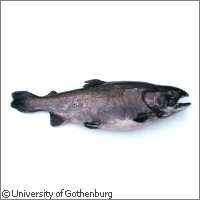EU-funded study urges caution on transgenic fish farming
How can we curb overexploitation of fish stocks and give commercial fish farming a boost? Some experts say transgenic fish, whose genetic material has been altered to boost growth rates, is just the ticket. But EU-funded researchers in Sweden have sounded a warning bell: the escape of transgenic fish into the natural environment could trigger many problems that affect the well-being of people. The research from Sweden's University of Gothenburg is part of the ERATS ('Ecological risk-assessment of transgenic salmon') project, funded with more than EUR 202,600 under the Marie Curie Actions mobility programme of the EU's Sixth Framework Programme (FP6). ERATS partners studied the environmental effects of genetically modified organisms (GMOs) within fish farming, seeking to better understand the potential ecological risks associated with commercial production of transgenic fish. Researchers have been able to produce fish that grow faster than normal, or are more resistant to diseases, by providing fish with genes from other organisms. These fish are known as transgenic fish. A transgene is a gene or genetic material that has been transferred naturally or by some genetic engineering techniques from one organism to another. The selected gene is propagated using bacteria and then isolated, purified and introduced into the eggs of the host fish by microinjection. The transferred genes contain a DNA sequence with codes for the required characteristic. To date, around 20 fish species like salmon, carp and catfish have been genetically modified. Advances in this field have also allowed researchers to produce fish that can cope better with cold weather. The upshot is that the fish can breed more easily in colder conditions. From a commercial fish farming perspective, experts believe transgenic fish can deliver higher production yields. But others say these types of fish can also carry risks and have undesirable effects on the natural environment. A case in point is the fact that environmental toxins may accumulate because transgenic fish can fight these toxins. If this happens, consumers will get the short end of the stick. Also, the higher level of growth hormone in the fish may affect consumers. 'Until further notice, transgenic fish should be bred in closed systems on land,' stated Dr Fredrik Sundström from the Department of Zoology at the University of Gothenburg. By simulating escapes in a laboratory setting, Dr Sundström was able to study transgenic salmon and rainbow trout to determine the ecological risks that could wreak havoc on the natural environment. The results showed that when they escape, transgenic fish have a significantly greater effect on the natural environment than hatchery-reared non-transgenic fish. GMO fish have a stronger chance of survival when there isn't enough food, for example. 'It is probably due to the fact that genetically modified fish have a greater ability to compete and are better at converting food,' Dr Sundström pointed out. A major concern, say researchers, is that transgenic fish would beat out their natural counterparts. But it's hard to determine how escaped transgenic fish would affect the natural environment, because a laboratory environment is not exactly the same as a natural setting. For Dr Sundström, across-the-board consensus is needed before commercial farming can get off the ground. A precautionary principle must also be applied, he said. 'One option is to farm the transgenic fish on land, which would make escape impossible,' the Swedish researcher explained. 'At least fertile fish should be kept in a closed system.' Commercial farming of transgenic fish is not allowed anywhere, but a number of applications for such operations are being assessed by EU and US authorities.
Countries
Sweden

